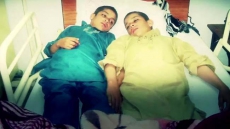What if clothes and other wearable items can sense your illness and transmit data to a doctor in a distant clinic for monitoring your health and prescribing drugs? This could be possible, thanks to new research by an Indian-origin scientist at University of Rhode Island.
Kunal Mankodiya, Director of the university's Wearable Biosensing Laboratory is researching how to transform gloves, socks, clothing and even shoes into high-tech items that will make people healthier -- and improve their lives.
"We are in the era of game-changing technology, especially in health care," Mankodiya said.
Mankodiya's research focuses on smart textiles -- wearable items embedded with sensors, electronics and software that can collect data from patients, even though they are at home, and deliver it to doctors.
Mankodiya's team is working on smart gloves that are embedded with sensors on the fingers and thumb that measure tremors and rigidity -- common symptoms of Parkinson's.
The gloves, in turn, are connected to cell phones, which process the data and deliver it to neurologists in their offices.
This way, doctors can manage the treatment plan of the patient on a day-to-day basis, ensuring that medication is working properly and eliminating the need for patients to make stressful clinical visits.
"Patients with Parkinson's face many mobility issues -- driving and even walking long distances," Mankodiya, an alumnus of Saurashtra University in Rajkot, Gujarat, said.
"The glove will give patients the option of receiving health care while remaining at home, and it also reduces the risk of falls and other accidents," he added.
Mankodiya is also working on high-tech socks for people who have suffered strokes. Again, sensors and software woven into the fabric relay information about a patient's gait to doctors and physical therapists so they can tailor rehabilitation therapy to each patient.
"The socks examine the walking stride," Mankodiya said in University of Rhode Island statement.
"They can quantify movements of the knee and ankle joints to find subtle irregularities that require therapy. The socks also monitor a patient's progress," he added.
Other projects of his team focus on developing tools to image, sense and record brain function to treat Parkinson's, as well as other neurological diseases, like epilepsy.





